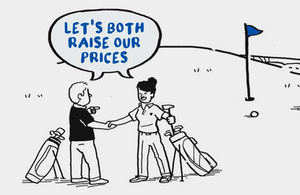North-east lawyers asked to help competition law awareness
North-east lawyers are being asked to help promote awareness of new competition law compliance materials to their business clients.

Over 50 law firms headquartered in the north-east of England will be contacted by the Competition and Markets Authority (CMA), and encouraged to share the CMA’s easy-to-use competition law information with their small and medium-sized enterprise (SME) clients.
The information is intended to help SMEs recognise anti-competitive practices, comply with competition law and report suspicions of illegal anti-competitive activity.
The approach is part of the CMA’s ongoing drive to boost awareness of, and compliance with, competition law, following the launch of its competing fairly in business: advice for small businesses materials.
The north-east is the fourth region of the country to be chosen as the target of an awareness-raising drive as research shows that businesses’ understanding of competition law in the area is low:
- Less than half of businesses in the north-east (45%) knew that price-fixing could lead to imprisonment
- Only 37% knew that dominant firms are under a special responsibility not to allow their conduct to impair competition - compared to 48% nationally
- Less than a quarter (23%) knew that setting the price at which others can resell your product is illegal
- Only 15% knew that reporting cartel activity could lead to a reward
- And only 12% knew that admitting to participating in a cartel could lead to immunity from a penalty
- Only 8% have run training on competition law
The consequences of breaching competition law can be severe:
- businesses can be fined up to 10% of their annual turnover
- company directors can be disqualified from managing a company for up to 15 years
- people involved in cartels can face up to 5 years in prison
The CMA has also commissioned further research which revealed that most small businesses have a shared ethical sense that certain anti-competitive practices, such as price-fixing, are unfair or wrong and want to do the right thing.
Ann Pope, CMA Senior Director of Antitrust Enforcement, said:
The victims of anti-competitive activity can often be other businesses, so knowing what illegal behaviour looks like and how to report it can help small and medium-sized businesses protect themselves.
The potential consequences of breaking the law are very serious. That is why it is important that all businesses know what to look out for and report suspected breaches to the CMA.
Legal advisers to SMEs are ideally placed to help raise awareness of competition law among their clients.
Isabel Taylor, Chair of the Competition Section at the Law Society, said:
Regional law firms can play an important role in explaining to their clients why they need to know about competition law. The CMA’s compliance and reporting materials are short, simple and clear and explain why businesses need to be able to identify unfair, illegal and anti-competitive practices.
Notes for editors
- The CMA is the UK’s primary competition and consumer authority. It is an independent non-ministerial government department with responsibility for carrying out investigations into mergers, markets and the regulated industries and enforcing competition and consumer law. For CMA updates, follow us on Twitter @CMAgovuk, Flickr and LinkedIn.
- The CMA has created a suite of competition law guidance materials to assist businesses and their advisers.
- The CMA has also created a form so anyone concerned about potential anti-competitive or market issues can raise an alert.
- Media enquiries should be directed to Simon Belgard (simon.belgard@cma.gsi.gov.uk, 020 3739 6472).